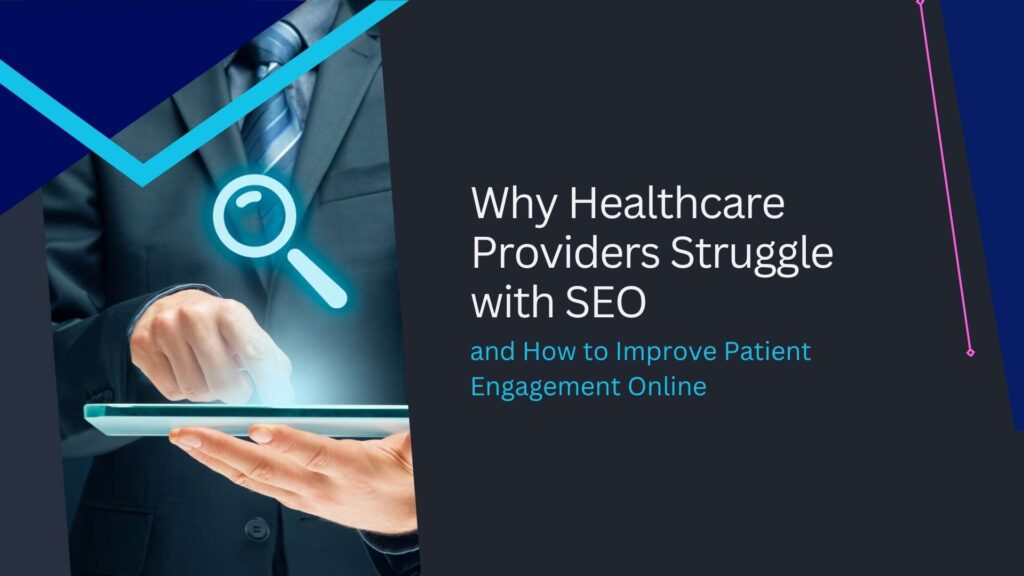Having a strong online presence is important, especially for healthcare providers. With patients increasingly turning to the internet to find doctors, book appointments, or seek health advice, a poorly optimized website can mean missed opportunities to connect with them.
The digital landscape serves as the first point of interaction between healthcare providers and potential patients, making it necessary to get search engine optimization (SEO) strategies right. Yet, many healthcare providers struggle with SEO. From navigating complex regulations to addressing unique patient needs, the challenges are significant.
This article taps into the common SEO hurdles faced by healthcare providers, offering actionable strategies to overcome them and thrive in an increasingly competitive digital landscape. You’ll understand how choosing affordable SEO services, and implementing the right practices can transform patient engagement and why partnering with experts can make all the difference.
Common SEO Struggles Faced by Healthcare Providers
Complex and Competitive Healthcare Keywords
Healthcare keywords often fall into two categories: overly broad or extremely competitive. Terms like “doctors near me” or “healthcare services” are highly sought after, making it tough to rank for them. This competition can leave smaller providers or niche practices struggling to get noticed.
Why Long-Tail Keywords Matter
Instead of targeting broad keywords, healthcare providers can benefit from long-tail and location-based phrases such as “pediatric dentist in Los Angeles” or “home healthcare services San Francisco.” These phrases are less competitive and cater to patients actively searching for specific services. When you focus on more targeted terms, you can improve visibility while addressing the unique needs of their local audience.
Additionally, using patient-specific keywords like “affordable physiotherapy for seniors” can set practices apart by directly addressing common concerns and pain points. Combining long-tail keywords with location-based strategies amplifies results and ensures that providers are visible to the right audience at the right time.
Content That’s Not Patient-Centered
Another common mistake is crafting content that’s overly technical, filled with jargon, or focuses on the provider rather than the patient. While medical accuracy is essential, engaging content that speaks to patient concerns fosters connection and trust. Patients are looking for clear, relatable, and actionable information—not medical school lectures.
The Need for User-Friendly Content:
Patient-centered content answers common health questions, provides practical advice, and uses approachable language. For example, instead of an article titled “Hypertension Management Protocols,” a more relatable option could be “How to Manage High Blood Pressure: Tips from Experts.” Infographics, FAQs, and video content can further enhance engagement by making information more accessible and easier to understand.
Creating content that anticipates patient questions, such as “What to Expect During Your First Physiotherapy Session,” builds trust and encourages patients to return to the website for reliable information. Furthermore, content that addresses seasonal concerns, like flu prevention tips, keeps your website relevant throughout the year.
Website Design and User Experience Issues
A poorly designed website can be a deal-breaker for potential patients. Issues like slow loading times, confusing navigation, and non-mobile-friendly designs can drive users away before they even engage with your services. First impressions matter, and in the digital world, your website is your front door.
Enhancing Website Usability:
Modern healthcare websites must load quickly, be responsive on mobile devices, and feature intuitive navigation. Clear calls-to-action, such as “Book an Appointment” or “Contact Us,” should be easy to find. Ensuring patients can locate the information they need in just a few clicks is crucial for conversions.
Moreover, accessible design features like adjustable font sizes and text-to-speech capabilities can make a significant difference for patients with disabilities or visual impairments. Incorporating patient portals that allow for easy appointment booking and access to health records can further enhance the user experience.
Compliance with Healthcare Regulations (e.g., HIPAA)
Healthcare providers face unique challenges when balancing SEO strategies with strict legal requirements like HIPAA. Violating these regulations can result in hefty fines and damage to reputation, making compliance non-negotiable.
Aligning SEO with Privacy Laws:
SEO efforts must ensure patient data protection. Strategies like encrypted contact forms and secure appointment booking systems can boost SEO without compromising compliance. Using privacy-friendly analytics tools and adhering to data minimization principles further supports this balance.
The Implications of Non-Compliance:
Failing to comply with healthcare regulations can lead to severe consequences, including significant financial penalties and reputational harm. Regulatory frameworks like the Health Insurance Portability and Accountability Act (HIPAA) in the U.S. and the General Data Protection Regulation (GDPR) in Europe mandate strict adherence to data protection and privacy standards.
Under GDPR, non-compliance can result in fines proportionate to the severity of the breach, often amounting to substantial figures, while HIPAA violations may lead to settlements or corrective action plans imposed by regulatory authorities. Beyond monetary consequences, failing to safeguard patient information can erode trust, which is vital for maintaining a positive relationship with current and future patients.
By adopting privacy-first approaches to digital strategies, such as using secure communication systems and limiting data collection to essential information, healthcare providers can align with compliance requirements. Collaborating with experts familiar with GDPR, HIPAA, and other regulations ensures strategies meet legal obligations while prioritizing patient confidentiality and trust.
How Healthcare Providers Can Improve Their SEO
Implementing Local SEO Strategies
SEO services focusing on local SEO are a game-changer for healthcare providers aiming to attract nearby patients. Tools like Google My Business (GMB) enable practices to appear in local searches, complete with reviews, contact information, and operating hours. This visibility directly impacts foot traffic and appointment bookings.
Creating Patient-Centered Content
Content is the backbone of any successful SEO strategy. Blogs, FAQs, and videos that address patient concerns not only improve SEO but also establish trust. When content resonates with patients, it boosts engagement and encourages repeat visits to your website.
Using Empathy in Content:
By incorporating storytelling and addressing real-life patient scenarios, healthcare providers can foster stronger connections. For instance, sharing a patient’s journey through recovery (with their consent) can resonate with readers and improve engagement. Adding expert tips or patient testimonials can further enhance credibility and relatability.
Regularly updating content to reflect the latest medical advancements or addressing common misconceptions can keep the website relevant and authoritative. Creating downloadable guides or checklists, like “How to Prepare for Surgery,” offers added value to patients.
Improving Website Speed and Mobile Compatibility
A slow or unresponsive website can deter potential patients and hurt search rankings. Google prioritizes mobile-friendly, fast-loading websites, making optimization essential for healthcare providers aiming to improve visibility and usability.

Best Practices for Speed Optimization
- Compress large images without compromising quality.
- Use a reliable hosting service.
- Minimize the use of heavy scripts.
- Leverage browser caching to reduce page load times.
Enhancing mobile compatibility by implementing responsive design ensures patients have a seamless experience across all devices. This also boosts search engine rankings, as Google’s algorithms prioritize mobile-first indexing.
Focusing on Structured Data and SEO Compliance
Structured data, such as schema markup, helps search engines understand website content better. It can improve visibility by enabling rich snippets like star ratings, FAQs, and event details in search results. These enhancements make websites more appealing and informative to users.
Balancing Compliance and Optimization:
Providers must ensure structured data implementation complies with healthcare regulations. Working with SEO optimization companies familiar with these challenges can make a significant difference. For instance, agencies like All In Outsourcing can integrate structured data while adhering to legal standards, ensuring both visibility and compliance.
By leveraging structured data, healthcare providers can showcase essential information, such as services offered, accepted insurance plans, and contact details, directly within search results.
The Role of SEO Agencies in Healthcare
Most healthcare providers hesitate to hire professional SEO services, often due to budget constraints or uncertainty about the return on investment. While the initial SEO services cost may seem like a significant expense, partnering with the right agency can drive measurable results.
Introducing All In Outsourcing
For healthcare providers navigating the complexities of SEO, partnering with experts offering affordable SEO services can be transformative. All In Outsourcing is a trusted SEO agency that specializes in affordable and effective SEO services tailored for small and medium businesses.
Why Choose All In Outsourcing?
- Experience: Years of expertise.
- Customized Solutions: Strategies tailored to the unique needs of healthcare providers.
- Cost-Effectiveness: Providing affordable SEO services without compromising quality.
- Long-Term Success: Building sustainable strategies that yield consistent results.
From improving local SEO to optimizing websites for speed and compliance, All In Outsourcing is a reliable partner in achieving long-term digital success. Our proactive approach ensures healthcare providers stay ahead of industry trends and patient expectations.
Enhancing Patient Engagement Through Affordable SEO Services
Healthcare providers face unique challenges in the SEO landscape, from targeting competitive keywords to balancing compliance with optimization. However, by using patient-centered content, local SEO, and expert guidance from agencies, you can overcome these challenges. Investing in affordable SEO services and the right strategies is not just about ranking higher on search engines—it’s about connecting with patients, building trust, and fostering long-term relationships.
Ready to enhance your online presence? Let us guide you on your SEO journey to success. With the right tools and expertise, you can transform your digital presence and significantly improve patient engagement.
